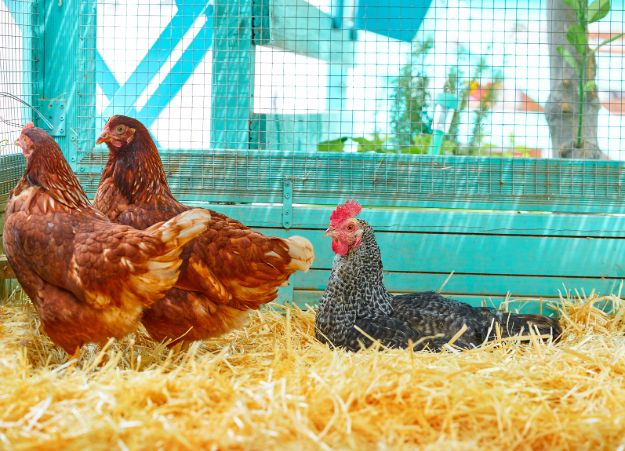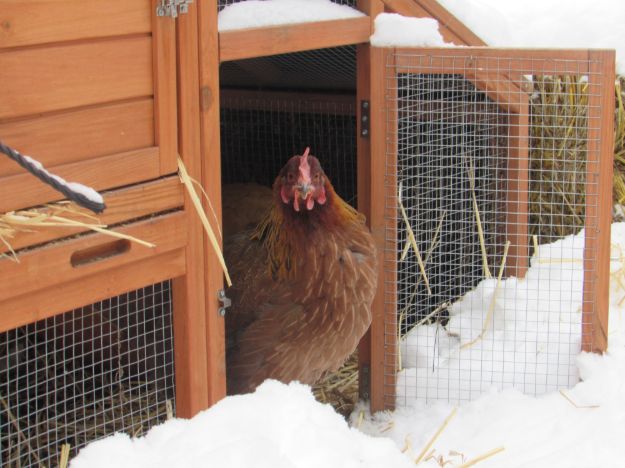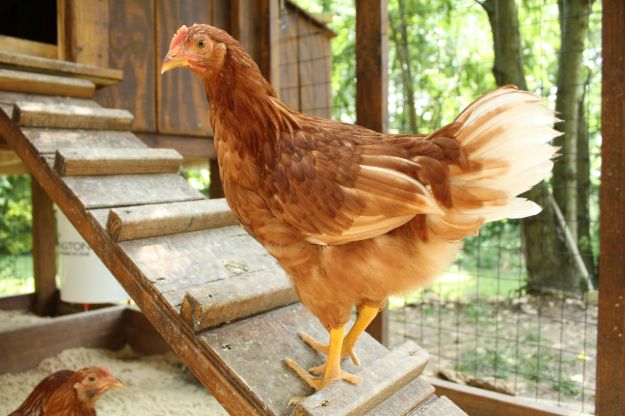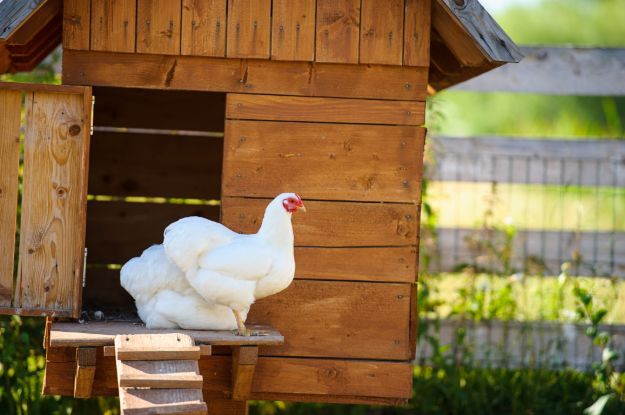Want to know how to protect your chickens? If you’re growing chickens in your homestead then these are homesteading tips you should know.
Protect Your Chickens From With These Simple Tips
Three times we watched my grandma cry over the destruction of her beloved animals before we succeeded in thwarting predators from invading the coop and killing the chickens. We lost the rooster, most of the eggs, and over half of the flock in the process, but we were finally able to keep the birds safe. Now, as an adult, I want a flock of my own. Before raising chickens I need to be sure I can keep my birds safe and avoid the massacre that my grandma witnessed all those years ago. So I did my research, called my family members, and spoke to some professionals to get some tips on keeping chickens safe from predators.

1. Understand The Enemy
Depending on where you live your tactic may be different for the predators you are trying to deter. For us the main culprits were raccoons, coyotes, and eagles. The best bet is to protect your chickens from all of the possible predators and understanding the various ways that they can infiltrate your coop. Raccoons, for instance, are crafty little creatures and can dig, climb, and even open locks or turn knobs. Many weasels and snakes can fit through very small spaces, coyotes and dogs can jump most fences, and hawks or eagles have the flight advantage. Some common predators for your chickens are:
- Racoons
- Coyotes
- Birds of prey
- Weasels
- Foxes
- Dogs
- Snakes
- Skunks
- Opossums

2. Flew The Coop
In order to keep these predators from invading, you’ll need to build or renovate your chicken coop to prevent entry. Make sure to build the coop raised from the ground to deter dangerous animals from making a den underneath it. This will also give the chickens an area to hide. Make sure to cover any opening, no matter how small, to deter snakes and weasels that are able to fit in very small spaces. Keep a cover over the coop and as well as the run to keep birds of prey from picking off your feathered friends. This will also help keep the climbers and jumpers at bay. Consider a locking mechanism for any doors that grant access to the coop. Simple locks will be easy for a raccoon to unlock, so be sure to use a two-step locking system.
There are some products available to keep some predators away as well including decoy animals, pinwheels, predator urine, or motion lights. Shiny objects like mirrors, pie pans, or CD’s are supposed to keep hawks away as well, however, many chicken owners have reported that this tactic doesn’t always work.
#Love #eggs too? Then, here's an intro to the best egg-laying #chickens! 🍳 https://t.co/ptPoMyaXk9 pic.twitter.com/fXSypb1Bee
— Homesteading (@HomesteadingUSA) April 10, 2017
3. De-Fence
They say a good defense is the best offense. This is why it is important to have the appropriate fence as a barrier between your chickens and the predators on the other side. Remember that chicken wire is not meant to keep predators out, but to keep chickens in. This was our first mistake with my grandma’s chickens. Chicken wire is extremely easy to bend and break. As an alternative, use hardware cloth. Hardware cloth is a wire mesh that consists of woven or welded wires that are very difficult for predators to get through. Be sure to fasten it with screws and not staples that are easy to pull out for a determined predator. Use hardware cloth around windows, openings, and buried around the perimeter to keep the digging animals from getting in.

4. Free Range VS. Caged
Your chicken coop will be the safest area for your chickens. Train them to return to their coop at the end of the night early on and they will be a lot safer long-term. Always remember to lock them up at the end of the night as many of their predators are nocturnal and will be more likely to attack at night. If your chickens are free range they will be at a higher risk than chickens kept in a run. If the coop is left open when they are roaming so that they can return to the coop, it is also left open for predators to sneak in and eat eggs or stalk your chickens.
If you do let your chickens roam, make sure to provide them with some shelter to hide from predators. This can be as simple as a picnic table or a shelter made from bushes and sticks. For the caged birds contained to a run, be sure to leave them enough room to roam without burdening yourself with a large build. The run should still be covered to thwart birds of prey, especially. There are options for electric fencing for your birds, some as simple as using two strands of electrified wire, to contain your flock. This can help keep some predators out, but will be very simple for flying predators to surpass.

5. Recruit Some Muscle
There are many options you can go with for your chicken’s bodyguard. Roosters are a great addition to your flock and have been known to fight off predators to protect their hens. They also sound an alarm to let you, as well as the other birds (and possibly the neighbors), know that there is a predator nearby. Many herding dogs are great muscle for thwarting a wide variety of predators. Be careful about recruiting a dog to watch your birds as many dogs have high predator drive and will chase them and even kill them by accident. However, many working dogs take their jobs very seriously and are great at protecting their chickens. You can also use Guineafowl, geese, or llamas.
Want to check out an exclusive predator prevention system? Watch this video from Echo Trailers Manufacturing:
Having a flock of my own chickens has been something I’ve wanted ever since I was a child and I spent days collecting eggs with my grandma and feeding the chickens bugs I found. Despite my fears of losing my flock and not being prepared to keep them safe, I believe I have learned from the time my family spent coming together to keep those chickens safe and the tips we learned in the process.
What do you think of these tips on how to protect your chickens? Let us know in the comments section what your thoughts are on these tips on raising chickens.
Want some tips in raising backyard chickens? Chect out our Homestead Handbook in Raising Backyard Chicken and raise your own flock now!
Follow us on Instagram, twitter, pinterest, and facebook!
This post was originally published in November 2015 and has been updated for quality and relevancy.


Leave a Reply